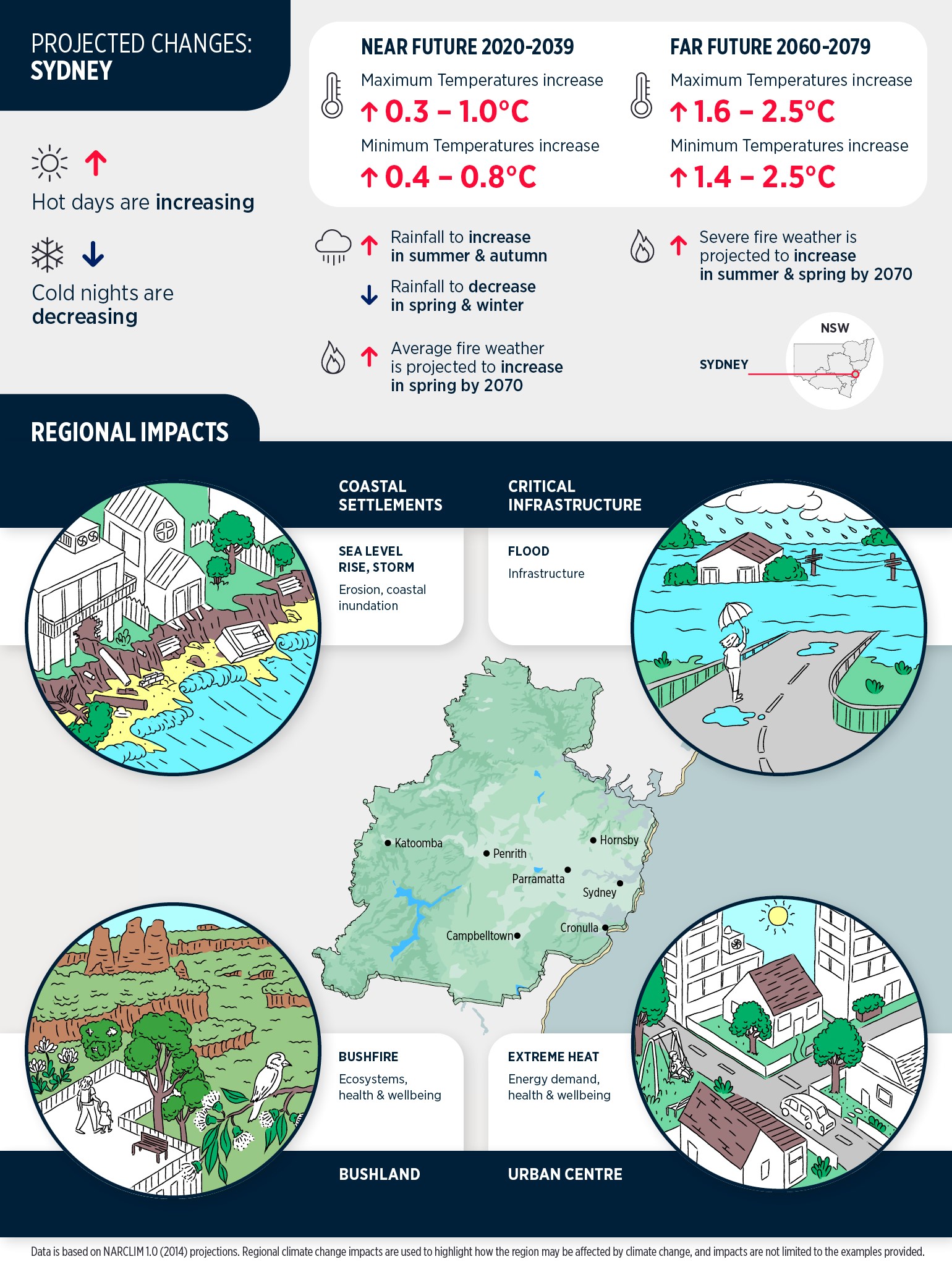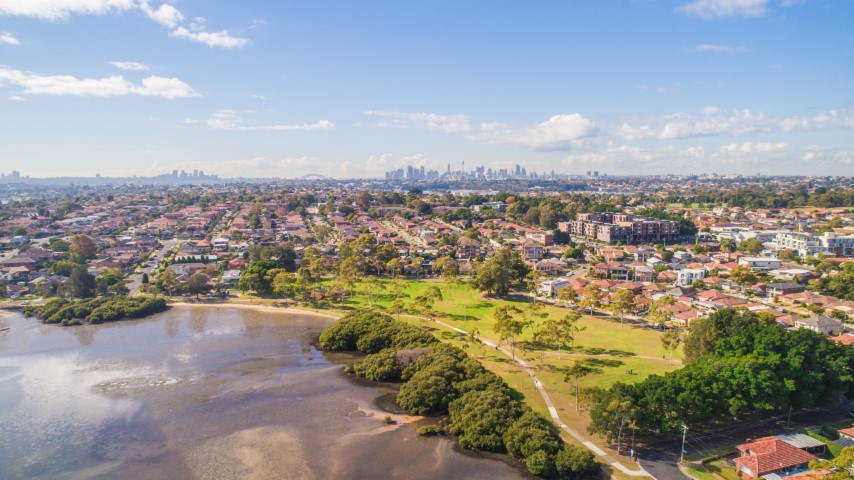Resilient Canada Bay
Get Prepared app
Are you ready for an emergency? Download the Get Prepared App.
At the City of Canada Bay, we encourage residents to prepare and stay safe in a disaster or crisis.
Emergencies can strike at anytime, anywhere and without warning. The good news is, it's easy to protect yourself, the people you love and the things you value most in just a few simple steps: download the Get Prepared app, create your emergency plan and keep it close to hand.
The Get Prepared app, co-created by Australian Red Cross and general insurer IAG, can guide you through creating your emergency plan.

Get Prepared is a free, easy-to-use tool to help you prepare for any type of emergency. You can:
- Review the risks relevant to where you live.
- Create checklists of actions to make an emergency plan.
- Save an emergency plan as a PDF to be printed and shared with others.
Download Get Prepared now!
Local climate resilience
“The climate in New South Wales is already changing, with extreme weather events becoming more frequent and intense, as well as long-term changes to weather patterns evolving. These changes can exacerbate existing risks and create new systemic risks and opportunities for government.” – Climate Risk Ready NSW Guide, NSW Department of Planning Industry and Environment.
City of Canada Bay is supporting our residents to become more resilient.
- We collaborate with the councils of Greater Sydney through the Resilient Sydney program to make our region more connected, inclusive and resilient.
- We are developing a local resilience framework and action plan to help the Canada Bay community become more resilient to the chronic stresses and major shocks affecting our local government area.
![]()
Timeline
| 2024 |
Council adopted a Climate Resilience Framework and is updating resilience assessments for key facilities. Council is also contributing to development on the new Resilient Sydney Strategy. |
| 2022 | Council updated its climate risk assessment and began developing a climate and resilience framework. Council also submitted its first CDP report, a global disclosure system for investors, companies, cities, states and regions to manage their environmental impacts. |
| 2021 | Council adopted an Emissions Reduction Action Plan which addresses climate mitigation for Council operations and our community. Council voted to phase out gas in Council operations. |
| 2019 | Council declared a ‘climate emergency’ through a Council resolution. Council has been acting on climate change for a number of years now. |
What is resilience?
Chronic stresses weaken the fabric of a city on a day-to-day or cyclical basis. Examples include ongoing issues such as rising inequity, lack of social cohesion and inadequate public transport.
Acute shocks are sudden, sharp events that threaten a city. Examples include heatwaves, floods, disease outbreaks and cyber-attacks.
Improving the systems and networks that make up a city will increase our resilience overall. Resilient systems withstand, respond to and adapt more readily to shocks and stresses. They emerge stronger after tough times and live better in good times.
Resilient Cities has developed the city resilience framework to provide a lens to understand the complexity of city systems and the drivers that contribute to their resilience.
- Climate change is the long-term change in climate patterns at the global and regional scale.
- Present day climate change is largely driven by increases in greenhouse gases in the atmosphere, which increases the greenhouse effect.
- Increases in the greenhouse effect result in the earth becoming warmer – sometimes called global warming.
- Current climate change is accelerated by human activities, such as burning fossil fuels, which produces greenhouse gases.
- There are many effects of climate change, including more intense extreme weather events, sea level rise and changing rainfall patterns.
What are the impacts of climate change?
Our warming climate has many impacts on people, environments and industries. Some of these impacts include:
- Sea level rise.
- Greater bushfire danger.
- More heatwaves and other extreme events.
- Impacts on the economy.
- Changing rainfall patterns, and more floods and droughts.
See Impacts of Climate Change for more information about how climate affects us. Find out more at NSW Government's Adapt NSW website.
Source: Basics of climate change, Adapt NSW (NSW Government).
As many of us are aware, the climate in Australia is changing, this brings challenges for the City of Canada Bay.
It is likely the City will experience hotter and drier summers, milder winters, more rainfall, an increased risk of flooding, a rise in sea levels and more extreme weather events including strong winds, lightning, hail storms and heat waves.
To reduce our vulnerability to climate change, the City of Canada Bay is anticipating potential climate issues and putting measures and actions in place to respond to these.
Action on climate change can be separated into two categories: mitigation and adaptation.
Mitigation
Mitigation refers to activities that aim to reduce climate change or the rate of change. Examples of mitigation include driving less and using less fossil fuels.
Adaptation
Adaptation refers to activities that aim to reduce the potential negative impacts of climate change, and capitalise on any new opportunities. Examples include planning for sea level rise and providing heat relief centres.
Climate Adaptation Plan
The City of Canada Bay is planning for the effects of climate change through preparation of a Climate Adaptation Plan. The Plan was developed through participation in the Adaptive and Resilient Communities (ARC) Program, a national capacity-building program run by International Council for Local Environmental Initiatives.
The Climate Adaptation Plan and Implementation Plan will provide a framework for Council to incorporate climate risks into plans for the future and will increase the awareness of climate change and potential impacts with our community.
Council is committed to providing a green, healthy and liveable City for our community with a focus on sustainability and climate change. Council will report to our community on the progress of the Climate Adaptation Action and Implementation Plan and provide opportunities for discussion through climate change conversations with our community.
Climate change is already affecting the Metropolitan Sydney region, particularly through increased temperatures and more extreme weather events. The impacts of these changes can be seen through the widespread bushfires of 2019–2020, increased coastal erosion and severe flood events.
Climate projections for Metropolitan Sydney, Adapt NSW


